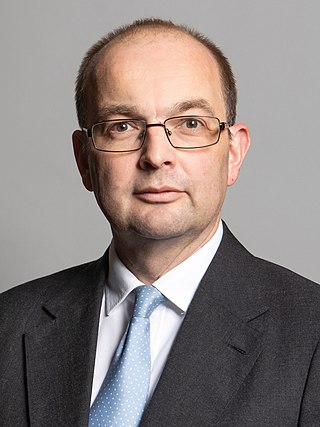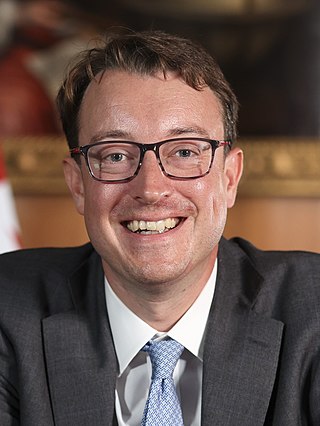Related Research Articles

The prime minister of the United Kingdom is the head of government of the United Kingdom. The prime minister advises the sovereign on the exercise of much of the royal prerogative, chairs the Cabinet and selects its ministers. As modern prime ministers hold office by virtue of their ability to command the confidence of the House of Commons, they sit as members of Parliament. The current prime minister is Rishi Sunak of the Conservative Party, who assumed the office on 25 October 2022.
The Conservative Party, officially the Conservative and Unionist Party and colloquially known as the Tories, is one of the two main political parties in the United Kingdom, along with the Labour Party. It is the current governing party, having won the 2019 general election, and has been the primary governing party in the United Kingdom since 2010. The party sits on the right-wing to centre-right of the political spectrum. It encompasses various ideological factions including one-nation conservatives, Thatcherites, and traditionalist conservatives. The party holds the annual Conservative Party Conference, at which senior Conservative figures promote party policy.

The Minister for Women and Equalities is a ministerial position in the United Kingdom which leads the Government Equalities Office. This is an independent department within the wider Cabinet Office that has responsibility for addressing all forms of discrimination, with particular emphasis on gender inequality. Prior to April 2019, the minister was based at the Home Office, DFID and DfE. Its counterpart in the shadow cabinet is the shadow secretary of state for women and equalities.
The House of Lords Appointments Commission (HOLAC) is an independent advisory non-departmental public body in the United Kingdom with oversight of some aspects of the Peerage of the United Kingdom. It has two roles:

Shailesh Lakhman Vara is a Ugandan-British politician, who served as Secretary of State for Northern Ireland from July to September 2022. A member of the Conservative Party, he has served as the Member of Parliament (MP) for North West Cambridgeshire since 2005.

Sir James Philip Duddridge, is a British politician and former banker. A member of the Conservative Party, he has served as the Member of Parliament (MP) for Rochford and Southend East since 2005. Duddridge previously held several ministerial positions under prime ministers David Cameron, Boris Johnson and Liz Truss.

The Cash-for-Honours scandal was a political scandal in the United Kingdom in 2006 and 2007 concerning the connection between political donations and the award of life peerages. A loophole in electoral law in the United Kingdom means that although anyone donating even small sums of money to a political party has to declare this as a matter of public record, those loaning money at commercial rates of interest did not have to make a public declaration.

The office of Downing Street Chief of Staff is the most senior political appointee in the Office of the Prime Minister of the United Kingdom, acting as a senior aide to the Prime Minister of the United Kingdom. The holder of the office retains a highly powerful, non-ministerial position within His Majesty's Government.

To date, there have been forty-six women and three men who have been married to the British prime minister in office. There have also been four bachelor and nine widower prime ministers; the last bachelor was Edward Heath (1970–1974) and the last widower was Ramsay MacDonald. The Duke of Grafton (1768–1770) and Boris Johnson (2019–2022) are the only prime ministers to have divorced and remarried while in office.

Christopher James Skidmore is a British former Conservative Party politician and author of popular history who served as Member of Parliament (MP) for Kingswood in South Gloucestershire from 2010 to 2024.

Mary Elizabeth Truss is a British politician who served as Prime Minister of the United Kingdom and Leader of the Conservative Party from September to October 2022. On her fiftieth day in office, she stepped down amid a government crisis, making her the shortest-serving prime minister in British history. The member of Parliament (MP) for South West Norfolk since 2010, Truss previously held various Cabinet positions under three prime ministers—David Cameron, Theresa May and Boris Johnson—lastly as foreign secretary from 2021 to 2022.

Sir Alec Edward Shelbrooke is a British Conservative politician who has been Member of Parliament for Elmet and Rothwell since 2010. He served as Minister of State for Defence Procurement in the Truss ministry from September to October 2022.

Mark James Littlewood is a director of Popular Development Partners Limited. He was formerly the director general of the libertarian free market Institute of Economic Affairs (IEA), and before that the chief press spokesman for the Liberal Democrats and the Pro-Euro Conservative Party and was an advisor to the Conservative Party under Prime Minister David Cameron. Having previously been in favour of deeper European integration, Littlewood later adopted a eurosceptic position and advocated voting Leave in the 2016 referendum on Membership of the European Union.
Crown Honours Lists are lists of honours conferred upon citizens of the Commonwealth realms. The awards are presented by or in the name of the reigning monarch, currently King Charles III, or his vice-regal representative.

Theresa May formed the first May ministry in the United Kingdom on 13 July 2016, after having been invited by Queen Elizabeth II to form a new administration. Then the Home Secretary, May's appointment followed the resignation of then Prime Minister David Cameron. The ministry, a Conservative majority government, succeeded the second Cameron ministry which had been formed following the 2015 general election. Cameron's government was dissolved as a result of his resignation in the immediate aftermath of the June 2016 referendum on British withdrawal from the European Union.

The 2016 Prime Minister's Resignation Honours are honours awarded following the July 2016 resignation of Prime Minister David Cameron. The life peerages and other honours were issued as two separate lists by the Cabinet Office on 4 August 2016 and all honours were gazetted as one list on 16 August 2016. This was the first Prime Minister's Resignation Honours since 1997.

Sir Simon Richard Clarke is a British politician who has been Member of Parliament (MP) for Middlesbrough South and East Cleveland since 2017. A member of the Conservative Party, he briefly served as Secretary of State for Levelling Up, Housing and Communities from September to October 2022 and Chief Secretary to the Treasury from 2021 to 2022.

The first Johnson ministry began on 24 July 2019 when Queen Elizabeth II invited Boris Johnson to form a new administration, following the resignation of the predecessor Prime Minister Theresa May. May had resigned as Leader of the Conservative Party on 7 June 2019; Johnson was elected as her successor on 23 July 2019. The Johnson ministry was formed from the 57th Parliament of the United Kingdom, as a Conservative minority government. It lost its working majority on 3 September 2019 when Tory MP Phillip Lee crossed the floor to the Liberal Democrats. An election was called for 12 December 2019, which led to the formation of a Conservative majority government, the second Johnson ministry.
The October 2022 Conservative Party leadership election was triggered by Liz Truss's announcement that she would resign as Leader of the Conservative Party and Prime Minister of the United Kingdom, amid an economic and political crisis.
References
- ↑ Blair's resignation honours list to be vetted The Guardian, 15 May 2007
- ↑ PM resignation gongs to be vetted BBC News, 16 May 2007
- ↑ "Blair misses deadline for resignation honours". The Guardian. 22 June 2007.
- ↑ Moss, Vincent (16 May 2010). "Gordon Brown to award peerages to John Prescott and Sue Nye". Mirror Online. Retrieved 7 January 2016.
- ↑ "Harman 'blocks' Brown's resignation honours list". PoliticsHome. Dods Parliamentary Communications. Archived from the original on 16 July 2011.
- ↑ Kennedy, Maev (1 August 2016). "From Lloyd George to the lavender list: the history of honours scandals". The Guardian. Retrieved 26 August 2016.
- ↑ "Resignation Honours 2016" . Retrieved 4 August 2016.
- ↑ Hope, Christopher; Swinford, Steven (12 July 2016). "Number 10 aides Ed Llewellyn and Craig Oliver to top 'Dave's cronies' resignation honours list". The Telegraph. Retrieved 13 July 2016.
- ↑ Stone, Jon (22 July 2016). "David Cameron's farewell honours list blocked by Whitehall over 'ethical' suitability of some appointments". The Independent. Retrieved 26 August 2016.
- ↑ "Boycott 'doesn't give a toss' about award critics". BBC News. 10 September 2019. Retrieved 10 September 2019.
- ↑ "Resignation Honours 2019". Cabinet Office. 10 September 2019. Retrieved 10 September 2019– via Gov.UK.
- ↑ "Liz Truss unveils resignation honours list". 29 December 2023. Retrieved 25 January 2024.
- 1 2 Gill, Martha (12 July 2022). "Abolish the resignation honours list before Boris Johnson makes a mockery of us all". The New Statesman. Retrieved 16 July 2022.
- ↑ Rea, Ailbhe (10 September 2019). "Is Theresa May's honours list normal?". The New Statesman. Retrieved 16 July 2022.
- ↑ "Outrage as Liz Truss gets a resignation honours list". The Evening Standard. 21 October 2022. Retrieved 24 March 2023.
- ↑ Catt, Helen; Seddon, Sean (25 March 2023). "Liz Truss resignation honours list criticised by ex-aides". BBC News. BBC. Retrieved 25 March 2023.
- ↑ Wheeler, Brian; Saull, Peter (29 December 2023). "Liz Truss unveils resignation honours list". BBC News. BBC. Retrieved 29 December 2023.